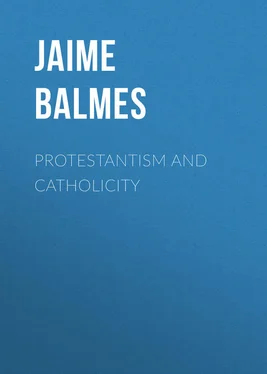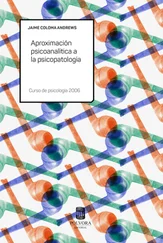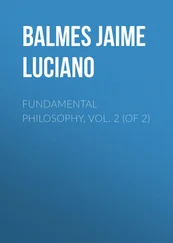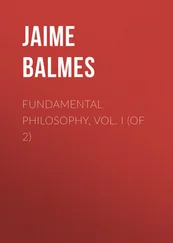Jaime Balmes - Protestantism and Catholicity
Здесь есть возможность читать онлайн «Jaime Balmes - Protestantism and Catholicity» — ознакомительный отрывок электронной книги совершенно бесплатно, а после прочтения отрывка купить полную версию. В некоторых случаях можно слушать аудио, скачать через торрент в формате fb2 и присутствует краткое содержание. Жанр: foreign_antique, foreign_prose, на английском языке. Описание произведения, (предисловие) а так же отзывы посетителей доступны на портале библиотеки ЛибКат.
- Название:Protestantism and Catholicity
- Автор:
- Жанр:
- Год:неизвестен
- ISBN:нет данных
- Рейтинг книги:3 / 5. Голосов: 1
-
Избранное:Добавить в избранное
- Отзывы:
-
Ваша оценка:
- 60
- 1
- 2
- 3
- 4
- 5
Protestantism and Catholicity: краткое содержание, описание и аннотация
Предлагаем к чтению аннотацию, описание, краткое содержание или предисловие (зависит от того, что написал сам автор книги «Protestantism and Catholicity»). Если вы не нашли необходимую информацию о книге — напишите в комментариях, мы постараемся отыскать её.
Protestantism and Catholicity — читать онлайн ознакомительный отрывок
Ниже представлен текст книги, разбитый по страницам. Система сохранения места последней прочитанной страницы, позволяет с удобством читать онлайн бесплатно книгу «Protestantism and Catholicity», без необходимости каждый раз заново искать на чём Вы остановились. Поставьте закладку, и сможете в любой момент перейти на страницу, на которой закончили чтение.
Интервал:
Закладка:
It is certainly not new in the history of the human mind for a doctrine, more or less reasonable, to be professed for a time by a certain number of learned and enlightened men; this has been shown in schools of philosophy both ancient and modern. But for a creed to maintain itself for many ages, by preserving the adhesion of men of learning of all times and of all countries – of minds differing among themselves on other points – of men opposed in interests and divided by rivalries, is a phenomenon new, unique, and not to be found anywhere but in the Catholic Church. It always has been, and still is, the practice of the Church, while one in faith and doctrine, to teach unceasingly – to excite discussion on all subjects – to promote the study and examination of the foundations on which faith itself reposes – to scrutinize for this purpose the ancient languages, the monuments of the remotest times, the documents of history, the discoveries of scientific observation, the lessons of the highest and most analytic sciences, and to present herself with a generous confidence in the great lyceums, where men replete with talents and knowledge concentrate, as in a focus, all that they have learned from their predecessors, and all that they themselves have collected: and nevertheless we see her always persevere with firmness in her faith and in the unity of her doctrines; we see her always surrounded by illustrious men, who, with their brows crowned with the laurels of a hundred literary contests, humble themselves, tranquil and serene, before her, without fear of dimming the brightness of the glory which surrounds their heads.
We ask those who see in Catholicity only one of the innumerable sects by which the earth has been covered, to point out elsewhere a similar fact; to explain to us how the Church has been able to show us a phenomenon, constantly existing, so opposed to the ever-varying spirit of the human mind; let them tell us by what secret talisman the Sovereign Pontiffs have been able to do what other men have found impossible. Those men, who bowed their heads at the command of the Vatican, who have laid aside their own opinions to adopt those of a man called the Pope, were not simple and ignorant men. Look at them attentively; you will see in the boldness of their mien their knowledge of their own intellectual power; you will read in their bright and penetrating eyes the flame of genius which burns in their breasts. They are the same men who have filled the highest places in the academies of Europe; who have spread their fame over the world, and whose names have been handed down to future generations. Examine the history of all ages, search all the countries of the world, and if you find anywhere such an extraordinary combination of knowledge in union with faith, of genius in submission to authority, and of discussion without breach of unity, you will have made an important discovery, and science will have to explain a new phenomenon. But you know well that you cannot do so. This is the reason why you have recourse to new stratagems in order to cast a shade on the brightness of this fact; for you feel that impartial reason and common sense must draw from it the conclusion that there is in the Catholic Church something which is not to be found elsewhere.
These facts, say our adversaries, are certain; the reflections which they suggest are dazzling at first sight; but if we examine the subject thoroughly, we shall see the difficulties they raise disappear. This phenomenon, which we have seen realized in the Catholic Church, and which is not found elsewhere, only proves that there has always been in the Church a fixed system, which has been developed with uniform regularity. The Church knew that union is the source of strength; that union cannot exist without unity of doctrine; and that unity cannot be preserved without submission to authority. This simple observation established, and constantly maintained, the principle of submission. Such is the explanation of the phenomenon. The idea, we grant, is profoundly wise, the scheme is grand, the system is extraordinary; but they do not prove any thing in favor of the Divine origin of Catholicism.
This is the best reply which they can make; it is easy to show that the difficulty remains entire. Indeed, if it be true that there has existed a society on earth which has been for eighteen centuries guided by one fixed and constant principle – a society which has known how to bind to this principle eminent men of all ages and countries, the following questions must be asked of our adversaries: – Why has the Church alone possessed this principle, and monopolized this idea? If other sects have been in possession of it, why have they not acted on it? All the philosophic sects have disappeared, one after another; the Church alone remains. Other religions, in order to preserve some sort of unity, have been compelled to shun the light, to avoid discussion, to hide themselves in the thickest shades. Why has the Church preserved her unity while seeking the light, while publishing her books in open day, while lavishing all sorts of instruction, and founding everywhere colleges, universities, and establishments of every description, where all the splendor of knowledge and erudition has been concentrated?
It is not enough to say that there was a plan – a system; the difficulty lies in the existence of this plan and this system; it consists in explaining how they were conceived and executed. If we had to do with a small number of men, in limited circumstances, times, and countries, for the execution of a limited project, there would be nothing extraordinary; but we have to do with a period of eighteen hundred years, with all the countries of the world, with circumstances the most varied, the most different, and the most opposed to each other; we have to do with a multitude of men who did not meet together, or act in concert. How is all this to be explained? If it were a plan and a system devised by man, we should ask, What was the mysterious power of Rome which enabled her to unite around her so many illustrious men of all times and of all countries? How did the Roman Pontiff, if he be only the chief of a sect, manage to fascinate the world to this extent? What magician ever did such wonders? Men have long declaimed against his religious despotism; why has no one been found to wrest the sceptre from his grasp? why has not a pontifical throne been raised capable of disputing the pre-eminence with his, and of maintaining itself with equal splendor and power? Shall we attribute it to his temporal power? This power is very limited. Rome was not able to contend in arms with any of the other European powers. Shall we attribute it to the peculiar character, to the knowledge or the virtues of the men who have occupied the Papal throne? There has been, during these eighteen hundred years, an infinite variety in the characters and in the talents and virtues of the Popes. For those who are not Catholics, who do not see in the Roman Pontiff the vicar of Jesus Christ, – the rock on which He has built His Church, – the duration of this authority must be the most extraordinary phenomenon; and it is certainly one of the questions most worthy of being examined by the science which devotes itself to the history of the human mind; how there existed for many centuries an uninterrupted series of learned men, always faithful to the doctrines of the Roman See?
M. Guizot himself, in comparing Protestantism with the Roman Church, seems to have felt the force of this truth; and its light appears to have made him confused in his remarks. Let us listen again to this writer, whose talents and renown have dazzled, on this point, so many readers, who do not examine the solidity of proofs when they are clothed in brilliant images, and who applaud all kinds of ideas when they are conveyed to them in a torrent of enchanting eloquence; men who, pretending to intellectual independence, subscribe, without inquiry, to the decisions of the leaders of their school; who receive their doctrines with submission, and dare not even raise their heads to ask for the titles of their authority. M. Guizot, like all the great men among Protestants, was aware of the immense void which exists amid its various sects, and of the force and vigour which is contained in Catholicity; he has not been able to free himself from the rule of great minds, – a rule which is explicitly confirmed by the writings of the greatest men of the Reformation. After pointing out the inconstant progress of Protestantism, and the error which it has introduced into the organization of intellectual society, M. Guizot proceeds thus: "People have not known how to reconcile the rights and necessities of tradition with those of liberty; and the cause of it undoubtedly has been, that the Reformation did not fully understand and accept either its principles or its effects." What sort of a religion must that be which does not fully understand and accept its principles or its effects?
Читать дальшеИнтервал:
Закладка:
Похожие книги на «Protestantism and Catholicity»
Представляем Вашему вниманию похожие книги на «Protestantism and Catholicity» списком для выбора. Мы отобрали схожую по названию и смыслу литературу в надежде предоставить читателям больше вариантов отыскать новые, интересные, ещё непрочитанные произведения.
Обсуждение, отзывы о книге «Protestantism and Catholicity» и просто собственные мнения читателей. Оставьте ваши комментарии, напишите, что Вы думаете о произведении, его смысле или главных героях. Укажите что конкретно понравилось, а что нет, и почему Вы так считаете.












